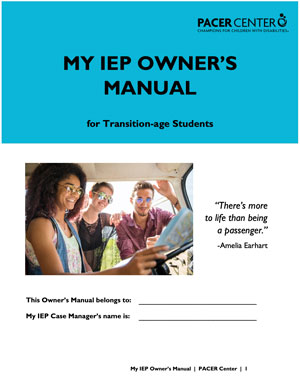
Advocating for Myself
Learning how to advocate for yourself could help you at school, at your job and in your community. Advocating for yourself means knowing what your needs are and speaking up for yourself to get your needs met. It takes practice! To hear tips from other students with disabilities who have learned to advocate for themselves in high school, at work, and at college, watch the videos in the collection below.
Self-Advocacy in High School
High school students Nathan and Justin host a morning talk show with special guest, Captain Self-Advocacy. Watch as Captain Self-Advocacy rescues a student who is struggling to participate in his own IEP team meeting. (9 min)
Are you struggling to get accommodations at school? Marissa is a high school student with a disability. In this video, she explains how she used her support system and the IEP process to advocate for herself and get the help and support that she needed in one of her classes. (1 min)
Marissa, a high school student with a disability, gives her advice how to communicate with other students and teachers about any problem you are having at school. (1 min)
Resources for IEP team meetings: Self-Advocacy Tools You Can Use
- Your IEP Meeting: A Great Place to Practice Self-Advocacy Skills
Self-advocacy is a big part of becoming an adult, and it takes lots of practice! At first, you may feel nervous about going to your IEP team meeting and speaking up for yourself. Here are some ideas that will help you get ready and feel more confident.
- Sample Self-Advocacy Plan
The most important part of self-advocacy is learning to share information about yourself with others. Use this tool to help you figure out what information you want to share with your IEP team at your next IEP team meeting.
- Chart Your Own Future: How Your IEP Can Help
What will you be doing after high school? Where will you be working? Going to school? How do you plan to have fun in your free time? What kind of life do you want? Getting more involved with your IEP team in writing your IEP can help you answer these questions and make your goals for the future possible.
- IEP Meeting Checklist for Students
Follow these easy steps before your next IEP team meeting, during the meeting, and after the meeting, to help you advocate for yourself with confidence and make your voice heard.

- My IEP Owner's Manual for Transition-Age Students
Your IEP helps you on your road to adulthood. It has lots of parts! Like the people on your IEP team, information about where you are right now in your life, your goals for your future, and activities you're doing this year to help you get ready for your future. What's in your IEP? Use this Owner's Manual to learn about the different parts of your IEP that will help you succeed in your plans for your life after high school. Get in the driver's seat of your IEP!
- My Student Snapshot for Transition-Age Students
You're ready to go to your next IEP team meeting. You're excited about speaking for yourself and telling your IEP team in your own words what you want them to know about you, your disability, and your plans and dreams for the future. Where do you start? Use this Student Snapshot to help you plan what you want to say. Then practice it with your family or your IEP Case Manager before your meeting. Remember, you are the expert on you!
This video gives you more information about the Student Snapshot and where to find other PACER Advocacy resources.- Giving Input at Your IEP Meetings: A resource for students
Individualized Education Program (IEP) meetings can be overwhelming and it can feel difficult to include your thoughts. Here are some tips to help you share your perspective and prepare for the meeting.
Self-Advocacy in the Adult World
Disclosing your disability is a very personal decision. It means making an informed decision when or if to tell someone about your disability. Your decision will affect you at school, at work, and in your social life. In this video, Nellie, Alex, Nick, and Mimi talk about how they made their own decisions to disclose their disabilities, and how it changed things for them. (4 min)
Matt, Hilary, Roberto, Amanda, Patrick, Luke, and Santana are all college students with different disabilities. In this video, they share their stories about how their disabilities have affected them in college and how they got help from the Disability Resources Office. They also give their advice for high school students about how to advocate for yourself. (6 min)
Jonathan is an adult with dyslexia who did not learn to read until he was 12 years old, and grew up to become an award-winning writer. He talks about how living with a disability has taught him two important lessons. First, being different does not mean that you are deficient. And second, you have to learn to ask for help and know that it is okay to get help. (4 min)
Additional Resources
- Teens and Young Adults with Disabilities: Be Your Own Best Advocate
Learning to be your own best advocate will make a big difference in your life. Speaking up for yourself will give you more control over making choices in your life and make it easier to stand up for your rights. Advocating for yourself will help people around you better understand what you think, what you want, and what you need. Here are strategies for practicing self-advocacy and more resources to help you become the best advocate you can be.
- Youth in Action! - Becoming a Stronger Self-Advocate
Are you learning to speak up for yourself to tell people what you need and what you want? Are you figuring out how to make more decisions in your life? Are you wondering what you can do to keep improving your self-advocacy skills? Click here for 4 easy steps you can take to become a stronger self-advocate!
- I Know Me Workbook - What does person-centered mean for me?
You know you better than anyone else! But it takes practice to talk about what you want with confidence. This workbook was created for you by the Minnesota Department of Human Services Disability Services Division (DSD). Use this workbook to help you think about your life, your hopes and dreams, and what’s important to you. Then, share your ideas with the people who support you, so that together you can plan the steps to reach your goals. That’s self-advocacy!


